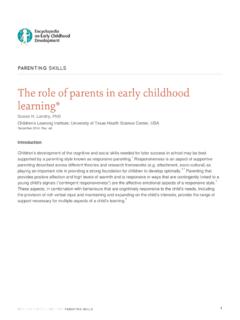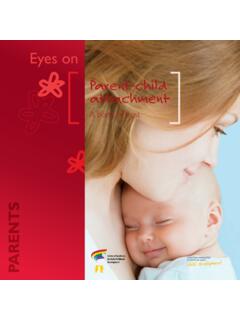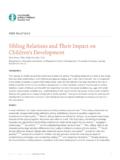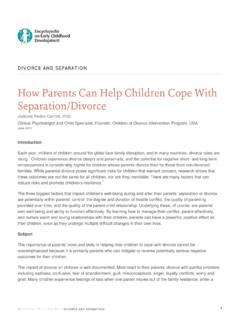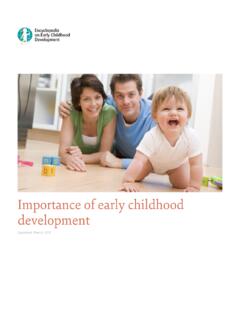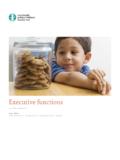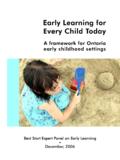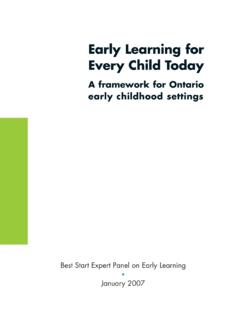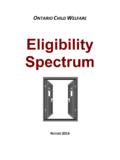Transcription of Community-Based Parent Support Programs
1 PARENTING SKILLSC ommunity- based Parent Support ProgramsCarol M. Trivette, PhD, Carl J. Dunst, PhDOrelena Hawks Puckett Institute, USAD ecember 2014, 3rd Parent Support Programs differ from traditional human services parenting Programs in both form and function1 For the purposes of this review, Parent Support Programs are defined as Community-Based initiatives designed to promote the flow of resources and supports to parents that strengthen functioning and enhance the growth and development of young primary goal of Parent Support Programs is to provide Support and information in ways that help parents become more capable and.
2 3 Research now indicates that to reach this goal, it is necessary that staff use practices that are family -centered as opposed to professionally-centered, and capacity-building as opposed to dependency ,5,6,7 The key characteristics of family -centered practices include: treating families with dignity and respect; providing individual, flexible and responsive Support ; sharing information so families can make informed decisions; ensuring family choice regarding intervention options; and providing the necessary resources and supports for parents to care for their children in ways that produce optimal Parent and child ,9,10,11 Home visiting Programs and Community-Based parenting Support Programs are two different approaches to enhancing parents abilities to Support their children s This review examines evidence concerning the effectiveness of Community-Based Parent Support Programs .
3 Parent Support Programs that use home visiting for delivering parenting services are described ,13 SubjectParent Support Programs aim to Support and strengthen existing parenting abilities and promote the development of new competencies so that parents have the knowledge and skills needed to carry out child -rearing responsibilities and provide their children with experiences and opportunities that promote child learning and Parenting Support Programs typically include the following features: universal access for 2014-2017 CEECD / SKC-ECD | PARENTING SKILLS111111families, early Support to families, and family involvement at all levels of program operation15 Parenting Programs often encompass a variety of parenting activities, including, but not limited to, Parent and child play groups, Parent information classes and Support groups, parenting materials, and individualized Parent supports provided in response to particular child -rearing concerns or specific parenting questions.
4 Providing or helping parents gain access to other types of supports and resources, such as medical or child care resources, is also an important feature of these ,3 Community-Based Parent Support Programs are based on the belief that when parents receive parenting Support as well as other supports and resources, they are more likely to feel better about themselves and their parenting abilities, and in turn interact with their children in responsive and supportive ways enhancing the development of their Bronfenbrenner,16 Cochran,17 and others18,19 have noted that parenting knowledge and skills are learned and strengthened by the kinds of help and assistance provided by informal and formal social Support network members.
5 The extent to which help and assistance enhances or compromises parenting competence and confidence depends to a large degree on the ways in which help is offered and ,3,21,6 Consequently, efforts to provide supports and resources to parents need to be done in ways that enhance rather than diminish parenting capacity. Enhancing parenting competence and confidence is one major goal of capacity-building help-giving Building Help-Giving Parent Support program staff use capacity-building helpgiving practices to provide supports to parents . Capacity-building helpgiving practitioners help family members acquire the skills to obtain resources, supports, and services.
6 Capacity-building practices Support and enhance parents competence and confidence to promote the development of their young children, including their social and emotional ,5 There are two dimensions of capacity-building helpgiving practices: relational and participatory ,24,25,6 Relational practices include behaviours typically associated with effective helpgiving (compassion, active listening, etc.) and positive staff attributions about program participant capabilities. Participatory helpgiving practices include behaviours that involve program participant choice and decision-making, and which meaningfully involve participants in actively procuring or obtaining desired resources or Enhancing and strengthening parenting capacity and the social and emotional development of young children are important outcomes of Community-Based parenting Programs .
7 The relationship between what program staff do and how parents enhance the social and emotional development of their young children is often implicitly rather than explicitly stated by Parent Support program builders. This paper includes information about the empirical evidence concerning the relationship between capacity building help-giving practices, parenting competence and confidence, and the behaviour and development of young children, including their social and emotional ContextBy design, most Parent Support Programs offer individualized, multifaceted interventions to parents in 2014-2017 CEECD / SKC-ECD | PARENTING SKILLS222222response to their changing concerns and needs.
8 Although most studies were not designed to disentangle and unpack the effects of these interventions, it is possible to do so by paying careful attention to the characteristics of helpgiver practices to identify the most important characteristics of Parent Support program Research QuestionsThe research questions to be answered are the following:Recent Research A number of research reviews and syntheses have been published that examined the relationship between family -centered helpgiving practices and Parent , family , and child ,22,27,5,28,29,30,31 The studies in these reviews and syntheses used different measures of family -centered capacity-building helpgiving, many of which assessed either or both relational and participatory helpgiving practices.
9 The Parent , child , and family outcomes in the studies in these reviews and syntheses included participant satisfaction with the helpgiver and his or her program, program helpfulness, social Support and resources, Parent and family functioning, parenting capabilities, and child behaviour and development. Several of these syntheses included measures of self-efficacy beliefs, where the investigators examined the extent to which the relationship between helpgiving practices and the study outcomes were mediated by belief ,5 Capacity-building help-giving practicesFindings in the majority of research syntheses indicate capacity-building helpgiving practices are related to a host of positive Parent , family , Parent child , and child ,27.
10 5 Both relational and participatory helpgiving practices were found to be related to participant satisfaction with program and practitioner supports, program resources, informal and formal supports, Parent and family well-being, family functioning, and child behaviour and development. The nature of the relationship between helpgiving practices and both parenting capabilities and child social-emotional behaviour help elucidate how Parent Support Programs influence these confidence, competence and providing Parent Support in a family -centered capacity-building manner increase parents sense of confidence and competence in their parenting ability?
